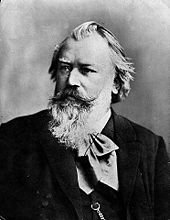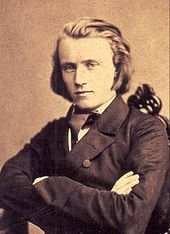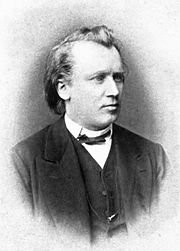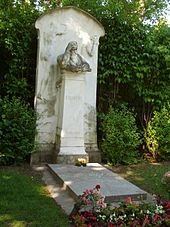11 days ago was Johannes Brahms' 184th birthday. Brahms made advancements to music in the wake of Beethoven. I would have posted this 11 days ago, but technical difficulties with Tchaikovsky prevented me. Here's a little bit about Brahms:

The Life of Brahms
Johannes Brahms was born on May 7th, 1833, in Hamburg Germany. At an early age, Brahms' father, a contemporary musician despite his family's disapproval, taught Brahms to play Violin, and the basics of Cello. From 1840 on, Brahms would study piano with Otto Friedrich Willibald. Willibald is known to have said that Brahms "could be such a good player, but he will not stop his never-ending composing." By 1845, Brahms had already written his first Sonata in G-minor. This disappointed his parents, as they thought he would prosper more as a performer than a composer (They disapproved of his composing). Brahms made his performance debut at the age of ten, playing pieces such as Beethoven's quintet for piano and winds Op. 16, a piano quartet by Mozart, and an étude of Henri Herz.

Brahms was first introduced into "Gypsy" style music when in 1850, he met and performed with Violinist Ede Reményi. Many popular pieces would come out of his exposure to this style (I think of the Hungarian Dances [Which I just realized Wikipedia also has listed]). 1850 was also when Brahms first contacted Robert Schumann. His friends encouraged (and persuaded) him to send Schuman a package of his compositions, but Schumann sent the package back unopened.
On a tour in 1853 with Reményi, Brahms was first introduced to a lifelong friend, violinist and composer Joseph Joachim at Hanover. Brahms had seen Joachim play a Beethoven violin concerto, and was deeply impressed. At the same time, Joachim was impressed by Brahms' solo piano works. It was through a letter of introduction (from Joachim) that Brahms would meet Robert and Clara Schumann. Schumann was so impressed by Brahms' work that he published an article called "Neue Bahne" or New Paths. It was in this article that Schumann wrote that Brahms was "fated to give expression to the times in the highest and most ideal manner." A quote that caused Brahms to feel a little self-critical. He wrote to Schumann in 1853 that this phrase "arouse such extraordinary expectations by the public that I [Brahms] don't know how I can begin to fulfil them." Schumann's encouragement led to Brahms' first publication of compositions. In 1863, Brahms met Richard Wagner for the first time. Brahms would play his Handel Variations for Wagner. Wagner would later make insulting comments about Brahms' music.

Brahms announced that he was starting his First Symphony to private friends in the early 1860's. He was very cautious and nit picky about details. He criticized himself writing to friends that it was "'long and difficult,' 'not exactly charming' and, significantly 'long and in C Minor' which, as Richard Taruskin points out, made it clear 'that Brahms was taking on the model of models [for a symphony]: Beethoven's Fifth.'" He would not complete (and debut) his first symphony until 1876 almost 2 decades after he had announced plans. Even after it premiered, Brahms would continue to "revise" the second movement until its publication. After his first symphony (often called Beethoven's 10th, I'll talk about that in my commentary in the list), Brahms was considered a major figure in music. He had participated in a jury which would award the (now) famous composer, Antonín Dvořák, the Vienna state prize three times. Dvořák actually dedicated his String Quartet, Op. 44 to Brahms.

In 1896, Brahms was diagnosed with cancer of the liver, a disease his father had died from. His last known public appearance was when he saw Hans Richter conduct his 4th Symphony. The audience gave Brahms an ovation after each of the 4 movements. Brahms died on April 3, 1897, at the age of 63. He is buried in the Zentralfriedhof cemetery in Vienna.
10 Compositions
Here are ten of Brahms' compositions (with commentary)
10. Symphony no. 4 (Movement 4)
This movement can be extremely soft at times, and extremely loud at times. I love the brass coral in the beginning, and how he uses the tympani to hold a bit of suspense throughout the flute solo. I also love towards the end, the horn interludes that he incorporates. I feel that composers are wise to use the horn for themes. This movement ends with a bold exhilarated sound (as the fourth movement of a symphony should end).

9. Piano Concerto no. 1 (Movement 3)
I LOVE the horn solo at 9:34 in this movement. This movement is definitely the energetic movement. But, the horn theme is what provides some tenderness to the whole movement. Then how Brahms incorporates the piano horn, oboe, and bassoon as a little transition towards the ending theme is genius. This movement is fun to listen to, and in my opinion, the best movement.

8. 4 Serious Songs
These songs are definitely serious. This style often reminds me of the songs Schubert wrote. These songs are an awful lot like Der Leiermann and Der Müller und der Bach. Both of those are "serious," and have a similar style. I have no idea why the person who made this video put these pictures in.

7. Horn Trio in E-Flat Major
I have included this piece in multiple list. This is definitely one of my favorite pieces by Brahms considering that it "features" a French horn as the main instrument. It is relaxing and energetic, and demonstrates the skill of the performer in dynamics (and endurance considering that it's thirty minutes and has only three instruments).

6. String Sextet Op. 18
This piece is subtle, and easily fades into background music. Certain parts sound as if they were inspired by a baroque composer such as Bach.

5. Violin Concerto (Movement 3)
This piece sounds really cool! this movement is very energetic, and it is incredible to watch the violinist (Julia Fischer)'s fingers as she plays. From the pieces I have heard, Brahms really seemed to have liked writing music for strings (violin), though he does do a lot with French horns.

4. German Requiem
This piece is beautiful. I didn't know that requiems could be in anything but Latin, so it was cool to see a Requiem in German. I have selected the 4th movement, and very similarly to the Fauré requiem, this movement is also very relaxing. The title is "How Lovely Is Thy Dwelling Place"

3. Symphony no. 2 (Movement 4)
One thing I will say about Brahms (as much as I may dislike him), he is pretty good at writing symphonies. I will talk about his advancements in the next selection, but this Movement is pretty good. It has everything a fourth movement needs, vigor, excitement, and a powerful ending. As much as Brahms can seem "boring" to me, he knew what he was doing (especially with symphonies).

2. Lullaby
This is probably Brahms' most famous piece. I have never heard it performed in something outside of a T.V. show/cartoon. The strings part is actually quite beautiful. In German, the piece's name is Wiegenlied. I think almost anybody reading this list will recognize this Brahms classic.

1. Symphony no. 1 (Movement 4)
What an awesome piece to end on. Brahms is not one of my favorite composers, but this piece is really cool. Brahms spent over two decades writing it, and advanced the art of symphony writing from where Beethoven had left off with the 9th symphony. This is why this symphony is often referred to as Beethoven's 10th. I chose this movement because 1, the 4th movement is usually the most energetic, and 2, there is a beautiful horn solo. This movement reminds me a lot of the first movement of Schubert's 9th Symphony "The Great", a piece I love. A lot of the themes sound similar, and it has the same kind of vigor in a way.

Sources
** Information **
Wikipedia
** Photos **
Wikipedia
Previous Composer Birthdays (In order by how recent it was)
5/12 - Gabriel Fauré
5/7 - Johannes Brahms
5/7 - Pyotr Ilyich Tchaikovsky
4/1 - Sergei Rachmaninoff
3/21 - Johann Sebastian Bach
3/4 - Antonio Vivaldi
3/1 - Frédérick Chopin
2/28 (29) - Gioachino Rossini
2/3 - Felix Mendelssohn
1/31 - Franz Schubert
1/27 - Wolfgang (Amadeus) Mozart
The Next Birthday will be Richard Wagner on May 22nd.
Thanks for reading this! Sorry this took so long to make, as I wrote Brahms isn't exactly my favorite composer, so I procrastinated this a lot. But, I now have a greater respect for Brahms as a composer after hearing some of these pieces! Please let me know which piece was your favorite, and remember to check back later!

Also remember to check for: My weekly 7 post, As Well As My Composer Birthday Posts
